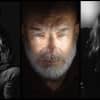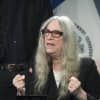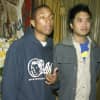Tired of reading the same recommended books from the usual sources? Just think of our weekly What We’re Reading column as your non-committal book club with The FADER and some of your favorite bands. For this installment, Senior Editor Amber Bravo reviews some of her favorite non-fiction pieces.
"Unknown Bards" by John Jeremiah Sullivan: Stefan Maralochakis recommended Pulphead in an earlier edition of WWR, and I'm now just getting around to reading it. JJS is an incredibly skilled essayist, but what I find maybe most surprising about his writing is the way he's able to hinge humor and personal anecdote into such thoughtful and information-packed pieces. "Unknown Bards" comes toward the end of Pulphead, but it is undeniably one of the collection's highlights. Originally written for Harper's it begins with JJS' amazing recount of fact checking (ATTN: editorial interns, even John Jeremiah Sullivan had to fact-check shit) a story for a Greil Marcus piece about Geeshie Wiley, more specifically, Marcus was looking for some confirmation on a particular lyric and felt that John Fahey would know. If you've never heard this song, you should listen to it now:
I remember the first time I heard it was watching Terry Zwigoff's excellent documentary Crumb, and being so transfixed by the song I went after the soundtrack (which actually contains two Geeshie Wiley tracks in addition to David Boeddinghaus' ragtime guitar pieces). In any case, JJS takes us through this rather nitpicky and revelatory lyrical dissection and—much to his credit—figures out the old English lyric thanks to Fahey and deep entry from the OED. But what's really amazing and best about this essay, is the window into the rabid record collecting and documenting of a certain set of mid-century white collectors of old, black folk music. The great archival work that went into compilations like Pre-War Revenants or the work of the vinyl savant Chris King, who could resuscitate a record in bad condition by analyzing how it was worn and recreate the physical conditions and shoddy equipment it was played on originally to recapture the best sound. It's a fascinating read, and a testament to JJS ability as both a researcher and stylist (and critic—he manages also to review two books on the subject halfway through!). Incredibly impressive and also helpful if you want a primer in early blues.
"Angels Dining at the Ritz" by Adam Gopnik: There have been several things recently that have made me think of Adam Gopnik's collection of essays Paris to the Moon. The first being that I was back in Paris for the first time since reading this book. Secondly, Parker Bruce recently mentioned it in a blog post about Drake playing in Paris. The book, in general, is a really great collection of essays Gopnik wrote when he did "The Letter From Paris" column for The New Yorker, but this essay was probably the most memorable for me because it seemed to encapsulate the romance of that city while also being a very poignant reflection on parenthood. Gopnik transplanted his wife and young son on this assignment, and in the essay, he writes about his son and his little girlfriend having play dates at the Ritz Carlton pool and being so swept up in the magic of these little people that he couldn't bear to tell his son that the prices were a bit beyond their means—they keep going back. Which leads me to the third reason why I was reminded of this essay: FRENCH CHILDREN ARE THE MOST ADORABLE, WELL-DRESSED KIDS ON THE PLANET. Hands down. I was shamed by six year olds the entire week I was there.
Just Kids by Patti Smith: ...And speaking of Paris, this book is great antidote for getting over the depression you feel coming back to New York after being in Paris for a week. I'm just going to jump on the bandwagon here and reiterate the 500 other people who've probably told you to read this book. This is one of the most touching accounts of friendship and youth that I've read in a long time. The book centers around Smith's friendship with Robert Mapplelthorpe, and I was truly impressed by her ability to capture and articulate her transformation as an artist, particularly in light of her relationship to Mapplethorpe, whom she'd always seen as being the real artist in their relationship and whom she supported both emotionally and financially for many years. I've always been a Patti Smith fan, but was sort of surprised by the kinship I felt towards her. Having known her through her voice and music first, I'd never gotten the impression that she was such a quiet and introspective person. My favorite sections of the book revolved around her memories of living at the Chelsea Hotel, and, to unintentionally come full circle with the early folk music thread, her memories of hanging out with Harry Smith. Warning: This book will also make you depressed once you're back in New York and you realize it's no longer 1972.


